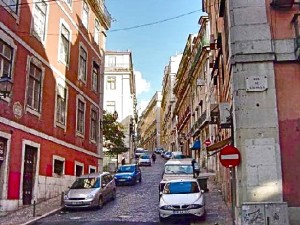“I felt as if time had taken a step to one side, a divergence as fine as a crack in the glaze on porcelain. Something unfamiliar had insinuated itself inside me…I no longer saw [Antonio], a thirty-year-old man in flesh and blood, sitting beside me on the seat [of that Lisbon taxicab] with its cracked leather, but a character, a character from a book. That same evening I made the decision to write it.”—Vincent Balmer, journalist
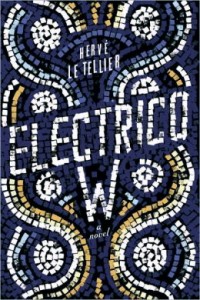 When Vincent Balmer, the speaker of this novel, decides to write a “novel” about someone he works with in Lisbon, the result is an engaging, though often unusual, story in which Vincent talks about his own writing while his troubled characters explore the present and share their unhappy pasts. As lovers fall in and out of love and fail to connect with the objects of their desire, a confessed serial killer goes on trial, “half asleep in the dock, utterly silent, his eyes blank.” I put the word “novel” in quotation marks here because though the speaker’s “novel” and his notes contain all the ingredients which could make the story an exciting best seller, French author Herve Le Tellier himself deliberately rejects the traditions of the novel as it has been written for hundreds of years. As a member of the French literary group “Oulipo,” a “workshop of potential literature” founded in 1960, Le Tellier is dedicated to finding “new patterns and structures which may be used by writers in any way they enjoy.” As a result, he takes this novel in many different directions which he fancies, leaving the reader to tag along for the ride.
When Vincent Balmer, the speaker of this novel, decides to write a “novel” about someone he works with in Lisbon, the result is an engaging, though often unusual, story in which Vincent talks about his own writing while his troubled characters explore the present and share their unhappy pasts. As lovers fall in and out of love and fail to connect with the objects of their desire, a confessed serial killer goes on trial, “half asleep in the dock, utterly silent, his eyes blank.” I put the word “novel” in quotation marks here because though the speaker’s “novel” and his notes contain all the ingredients which could make the story an exciting best seller, French author Herve Le Tellier himself deliberately rejects the traditions of the novel as it has been written for hundreds of years. As a member of the French literary group “Oulipo,” a “workshop of potential literature” founded in 1960, Le Tellier is dedicated to finding “new patterns and structures which may be used by writers in any way they enjoy.” As a result, he takes this novel in many different directions which he fancies, leaving the reader to tag along for the ride.
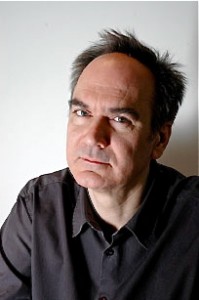
Vincent, the novel’s speaker, has recently returned to Lisbon from Paris following a failed love affair, and he has been working on two projects which he is anxious to finish, a novel he is writing about Pescheux D’Herbinville, who killed mathematician Evariste Galois in a duel thought to have been about a woman, and the translation of a bizarre collection of over a thousand “short stories” by Jaime Montestrela. Some of these stories, only a sentence long, appear throughout this novel. In his “day job,” Vincent is the Portuguese correspondent for a Paris news organization, in which role he is working with Antonio (Tonio) Flores, a photographer, covering the trial of a serial killer for a Paris magazine, a narrative which fades into the background when the speaker becomes more interested in writing the story of Antonio, the people they both know, their overlapping histories, and their real and imagined amours.
Naming his book “Electrico W,” the name of a tram line in Lisbon in the 1970s and 1980s, when the book takes place, Le Tellier (along with his speaker and sometimes alter-ego, Vincent) has chosen the perfect image to epitomize the story of Antonio, and ultimately Vincent himself. Every school day from the time he was eleven, Tonio would race the Electrico W tram through the streets of the Bairro Alto and down the hill to the center of Lisbon, “like a boy possessed,” keeping his eye on the tram’s power cable – “the trailing black tail of a tired old dragon.” Now adults, Antonio, Vincent, and the other characters here are all still chasing something that they cannot quite catch – in most cases, the love of their dreams. Antonio’s dream lover, for example, is someone he met when he was ten and she was eight, after one of his breakneck runs on the tram line – a young girl named Duck. Though she disappeared from his life long ago, Tonio has never been able to forget her. Vincent himself has recently been obsessed with a woman named Irene, a twenty-year-old in Paris, who has never had an interest in him.
Each chapter of the developing novel takes place during one day of Antonio’s nine-day stay in Lisbon, and each spotlights one of the characters in the novel: Aurora, a young artist/musician who lives on an island and who jokes that she turns her lovers into plants; Pinheiro, the serial killer of thirteen people, who wears chain mail underwear; Manuela Friere, a woman Victor persuades to pretend to be his lover so that he will not appear to be “needy”; Paul, Victor’s brother, who describes Victor’s family background; Duck, Antonio’s “dream girl”; and eventually, Victor himself. The information in all these chapters is loosely structured, to say the least, as the author includes much extraneous information unrelated to the chapter’s featured character. Gradually, Victor and Antonio become wary of each other, with some suggestions that each may be seeking some kind of unexplained revenge.
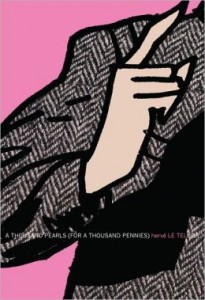
Cover, Le Tellier’s A Thousand Pearls (for a Thousand Pennies)
Many seemingly random details and images associating love with death appear, and while these may have little connection to the “plot,” they do connect with the themes. Antonio tells about the death of a street urchin in Brazil. Victor recalls Harry, a photographer in Munich on June 6, 1945, who who left, unpublished, a particular photo of a death camp survivor as a reminder to himself of his own cruelty. Brief references to the dictatorship of Antonio Salazar exist side-by-side with the symbolism of a trip taken by Victor to the Okavango Delta, “that river that doesn’t know how to find its way to the sea.” Le Tellier even inserts the obituary of Italo Calvino, famed author and lionized member of the Oulipo group, while also associating Electrico W with the Odyssey, perhaps ironically, though there are parallels between the characters’ wanderings, their experiences with seductive women, and the fates of Antonio and Odysseus.
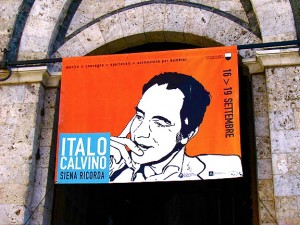
Banner honoring famed Oulipo writer Italo Calvino, who died in Siena in 1985. Photo by Chris Carlsson
Photos, in order: The author’s photo is from http://www.placepublique-rennes.com
The Lisbon tram, possibly Electrico W, appears on http://transpressnz.blogspot.com
The Sao Paulo neighborhood where Vincent keeps an apartment was photographed by Diagev for http://members.virtualtourist.com
Le Tellier’s A THOUSAND PEARLS (FOR A THOUSAND PENNIES) is widely available in English.
This banner from Siena commemorates the death of Italo Calvino, one of Italy’s most famous authors, who died there in 1985. Photo by Chris Carlsson. http://www.nowtopians.com
ARC: Other Press

